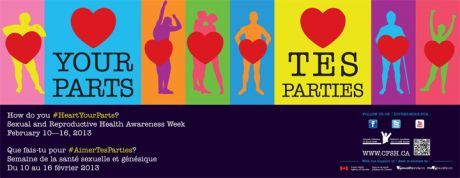Reports
You are here
Heart Your Parts

March 6, 2013
This year’s Canadian Federation for Sexual Health campaign, “Heart Your Parts,” managed to pull off a surprising feat: navigating the mainstreamed expectations of mainly heterosexual, penetration-based sex, and the minefield of shame-and-blame based sex education narratives, it developed a campaign that was surprisingly inclusive without alienating or putting readers off with jargon. Simply put, it managed an immensely inclusive campaign that did not erase differences between people and their diversely sexual lives.
Some may wonder what can be so difficult about sexual health? The first thing many people think about is, use a condom and you’re good. And, if you throw in dental dams, doesn’t that about cover everything? In this view, the sex ed. spiel is basically, “Use a condom or a barrier method of some kind and you won’t get sick or pregnant. Oh, and get consent first.” Simple, right?
The problem is that this dumbed-down, faux-universalized version of sex ed. manages in one short phrase to completely miss the three main points of today’s sex-positive healthcare: not all sex involves penetration; physical risks are not just about sexually transmitted diseases and pregnancy, and there can also be emotional and mental health-related risks; and finally, for many—even most—people, additional socioeconomic factors exist that raise their level of risk and for which they are not to blame.
A basic parallel which can illustrate the issues with the mainstream approach just described is this: in the realm of body weight, the old-school health education narrative was, if you eat right and exercise you won’t get fat. There were issues with not recognizing that health has socioeconomic indicators, that not everyone has access to eating right, etc.; but if you get fat, it’s your fault, because you should have eaten right and exercised. Part of the result is that not only are individuals to blame, but they should be ashamed of being fat. This way of talking about health bolsters the fatphobic aspect of capitalist culture.
By the same token, the mainstream approach to sexual health explicitly blames and shames people for having unprotected sex and for getting sick and, implicitly, for not engaging in penetration sex. Further, it leaves out factors such as how capitalism makes people—especially trans people, women and aboriginal people—internalize the idea that their bodies do not belong to them, leaving them to wonder how they can make decisions about their bodies. Other socioeconomic, class-based and oppression-based factors affecting health also hold true for sexual health. And sexual health is not just about certain body parts, but also about the whole person living a fulfilled life.
These ideas are evolving, and the ones I describe here are slowly becoming part of more mainstream discourses. Because it is still evolving, there was some unevenness to the Heart Your Parts campaign material. The How-to section in particular shows the influence of pressures not to change too much, too fast. The video contest illustrates this well: the videos ranged from a basic how to use a condom/sex dam, to a cute video with a much more holistic approach to the question. But the overall tone of the campaign walked the line admirably, and the guest blogs are particularly well worth reading. The campaign will take place again next year.
Section:
Topics:










